#jimmy sees social structures as a suggestion and his relationships as whats always most important and he schemes to accomodate that
Text
Howard is chucks Jesse send tweet
#i really didnt feel this vibe originally when i watched it#but chuck is awful to everybody#and hea manipulating howard so much like#howard is reprimanding kim for aomething that jimmy did and chucks just staring at him#like chuck is essentially howards fathers friend and business partner and howard is trying to fi his fathers role in the firm#howard respects chuck SO MUCH and chuck knows that and hes been using that to like#belittle and sabotage his brother so he wouldnt have to#i dont think he cares about howard either i dont think chuck is a character that values personal connections very much#i think he wishes he does#but hes much more dedicated to concepts and ideas#like the law as a whole or how he tries to live like a classy rich guy while all his windows are covered in foil#like how he tells jimmy that everybody deserves a vigorous defense but then almost leaves jimmy without one in cicero bc of his grudge#and he has high standards for how jimmy has to treat people but doesnt really meet those himself#just bc hes manipulating and hurting fewer people less obviously#i think the mcgill boys have. a lot more in common than they think they do#but those commonalities are so differently directed fhat they cant even see it#jimmy sees social structures as a suggestion and his relationships as whats always most important and he schemes to accomodate that#chuck cares more about social structures and his relationship and schemes to keep them safe from jimmy#i like chuck more at the end of these tags than i did when i started#but still#i dont like the way hes hurting my sweet jimmy#like howar is our villain who did nothing wrong n i think chuck is the real villain who we still sympathize a lot with bc hes so vulnerable
1 note
·
View note
Text
24 great books for quarantined sports fans
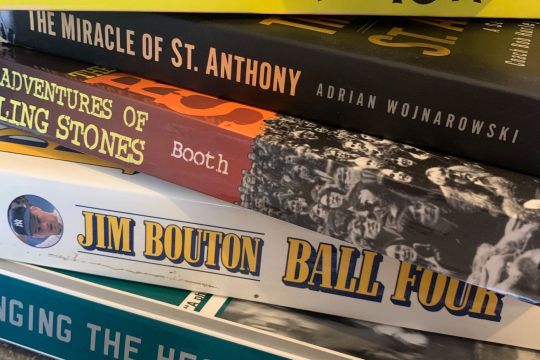
From ‘Ball Four’ to ‘Out of Sight’, here are a few books you can come back to over and over again
I love my books. They have traveled with me across the country and back again, prominently displayed in cheap bookcases throughout dozens of apartments around the Northeast. Currently, they are stretched out behind me in my home office where they will stay until the time comes to move off the grid. They will follow me there, as well.
I have read all of them at least once and several of them dozens of times. During periods of my life when I was without human companionship they were literally my only friends. That’s not said for sympathy. The life of a newspaper sportswriter in the 90s and early 2000s involved shitty hours and weekends, which pretty much negated any hopes of having a social life.
Through it all, my books were there for me. They demanded nothing but my time and gave me hours of entertainment.
I’m not particularly proud of my collection. There is very little literature to be found and only a handful of what one might refer to as great works. It mainly comprises sports books, rock star biographies, and a nearly complete set of Elmore Leonard novels.
Most of them are several decades old because I had to stop buying books at some point when I began to run out of room. I’m not linking to them because you can hopefully find an independent bookstore near you that would be thrilled for the business. Do them and humanity a favor.
Here are some of my favorites.
BASKETBALL
The Breaks of the Game: David Halberstam
This is the monster of all sports books, the one against which every basketball book is competing with in one way or another. If you know nothing of the NBA pre-LeBron James, this is where you should start. It’s a window into what feels like another universe, when pro basketball was a cult sport struggling for survival.
Loose Balls: Terry Pluto
I wrote about this one at length and won’t belabor the points I made back before the world came to a screeching halt. If you can’t get into the stories contained within these pages, I frankly don’t want to know you.
The Macrophenomenal Pro Basketball Almanac: The FreeDarko collective
It’s an exaggeration to say every person who heard the first Velvet Underground album went out and formed a band, just as it is to suggest that every writer who consumed FreeDarko wound up writing about basketball on the internet. But almost everyone who did was influenced by them.
The Miracle of St. Anthony: Adrian Wojnarowski
Long before he was the great and powerful Woj, the author spent an entire season with Bob Hurley’s St. Anthony Friars. It’s a masterful bit of storytelling that for my money is the absolute best of the surprisingly robust sub-genre of books about high school basketball.
Other contenders include The Last Shot by Darcy Frey, Fall River Dreams by Bill Reynolds and In These Girls, Hope is a Muscle by Madeleine Blais.
The Jordan Rules: Sam Smith
Judging from the early reactions to the gigantic Bulls documentary, it’s quite clear a lot of you should get familiar with the source material. Smith’s book was shocking upon its release because it dared show Michael Jordan as he really was, without the buffed out Nike shine. It holds up, clearly.
Halbertsam’s Playing for Keeps picks up the story in 1998 and provided much of the narrative structure of the first two episodes.
Heaven is a Playground: Rick Telander
An all-time classic set on the courts of mid-1970s Harlem during a long, hot summer. There are a lot of books that tried to get at the soul of basketball, but this is the standard bearer. I’d really like to know whatever became of Sgt. Rock.
Others in this vein include The City Game by Pete Axthelm, Pacific Rims by Rafe Bartholomew and Big Game, Small World by Alexander Wolff.
Second Wind: Bill Russell
The best athlete autobiography of all time.
BASEBALL
Lords of the Realm: John Heylar
The inside story of how baseball owners conspired for almost a century to suppress salaries while refusing to integrate. It’s shocking how buffoonish management acted during the glory days of the national pastime. Required reading.
Marvin Miller’s A Whole New Ballgame is a worthy companion piece, as is Bill Veeck’s delightful, Veeck as in Wreck.
Ball Four: Jim Bouton
Scandalous upon its release in 1970, Ball Four contains the best line ever written in any sport book: “You see, you spend a good piece of your life gripping a baseball and in the end it turns out that it was the other way around all the time.”
I read Ball Four for the first time in fifth grade and immediately taught my classmates the words to “Proud to be an Astro”:
Now, Harry Walker is the one who manages this crew
He doesn’t like it when we drink and fight and smoke and screw
But when we win our game each day,
Then what the fuck can Harry say?
It makes a fellow proud to be an Astro
Seasons in Hell: Mike Shropshire
There is nothing more soul-crushing than spending an entire season with a bad team. Shropshire covers three hilariously inept campaigns with the Texas Rangers, who as then-manager Whitey Herzog noted: “Defensively, these guys are really sub-standard, but with our pitching it really doesn’t matter.”
Ladies and Gentlemen, the Bronx is Burning: Jonathan Mahler
An underrated late addition to the pantheon that tells the story of the 1977 Yankees amid the backdrop of a city gone to hell.
You will notice there are few books in my collection about modern baseball. There’s a reason for that. The vast majority of them are peans to the wonders of middle management and therefore boring as hell.
FOOTBALL
Playing For Keeps: Chris Mortsensen
The incredibly bizarre — and largely forgotten — story of how the mob tried to gain influence in pro football via a pair of shady agents named Norby Walters and Lloyd Bloom. Good luck finding it.
Bringing the Heat: Mark Bowden
You may recognize Bowden from such masterworks as Black Hawk Down and Killing Pablo. You probably don’t remember that he spent a year with the Eagles after the death of Jerome Brown. As honest and unflinching a look at pro football as you will ever find.
North Dallas Forty: Peter Gent
The only piece of sports fiction on my list is not so fictional at all. Gent’s thinly-veiled account of his own life as a receiver for Tom Landry’s Cowboys is shocking and brutal and sad and poignant. I make time to read it every year.
I used to have more football books, back when I cared about the sport.
MEDIA
Fear and Loathing on the Campaign Trail: Hunter S. Thompson
The Vegas one is more popular and Hell’s Angels is a stronger work of reportage, but for a dose of pure Gonzo insanity, this is the book I come back to more often than not.
The Boys on the Bus: Timothy Crouse
The companion piece to Thompson’s lurid account, Crouse plays it straight and lays bare the bullshit facade of campaign reporting. Almost 50 years later, we have still learned nothing.
The Franchise: Michael McCambridge
Details the glory days of Sports Illustrated, reading it now feels like an obituary. It was fun once, this business of writing about sports.
MUSIC
Heads, a Biography of Psychedelic America: Jesse Jarnow
My favorite book of the last few years, Jarnow takes us on a bizarre trip through the byzantine world of psychedelic drug networks connecting it through the career of the Grateful Dead and into modern-day Silicon Valley. I’m waiting for the followup on Dealer McDope.
Not music, but as a companion piece, Nicholas Schou’s Orange Sunshine tells the even-crazier tale of The Brotherhood of Eternal Love, who took over the LSD trade and invented hash smuggling by stuffing surfboards with primo Afghani hash and shipping them back to California.
The True Adventures of the Rolling Stones: Stanley Booth
Reported while on tour with the Stones at the height of their powers circa Let it Bleed, Booth took 15 years to write the damn thing. By then the Stones were already an anachronism. It’s all there, though. Sex, drugs, more drugs, and unbelievable access to the biggest rock ‘n roll band in the world.
This Wheel’s on Fire: Levon Helm with Stephen Davis
In which Brother Levon disembowels Robbie Robertson and exposes the lie at the heart of The Band. Robbie took the songwriting credit and all the money.
Satan is Real: Charlie Louvin
Astonishingly good read that is best consumed with Charlie and his brother Ira playing low in the background.
Mainlines, Blood Feasts, and Bad Taste: A Lester Bangs Reader
Lester is an acquired taste and not all of his ramblings hold up. I will always love him for despising Jim Morrison and completely nailing what made Black Sabbath important. Spoiler: They were moralists like William S. Burroughs.
Please Kill Me: Legs McNeil and Gillian Welch
The definitive oral history of punk rock, an essential document of a scene that launched a thousand mediocre bands and the Ramones, who ruled.
Shakey: Jimmy McDonough
A tour-de-force biography of Neil Young that loses steam toward the end when McDonough makes himself the subject. The stuff about Neil’s bizarre 80s period and his relationship with his son is heartbreaking.
Our Band Could Be Your Life: Michael Azerrad
Pretty much everything you need to know about bands like Mudhoney, Black Flag and Mission of Burma who wove together the musical underground through a patchwork collection of local scenes back when something like that was still possible.
ELMORE LEONARD
You can’t go wrong with anything Leonard writes, but Out of Sight is as good a place to start as any.
0 notes
Text
THE AARONS 2017 - BEST TV EPISODE
My consumption of serialized TV seems to be inversely correlated to the amount of bing-watching I do. I love the more complex storylines and engaging characters of serialized TV, but I also like having time to reflect on how each episode works as a piece of the whole. That’s why I designed this award to look at the exemplary singular efforts in TV this year. Here are The Aarons for Best TV Episode:
#10. “The Ricklantis Mix-Up” (Rick and Morty, Season 3, Episode 7)

The promise of Rick and Morty taking their absurd antics to the realm of Atlantis was enticing… but it was not meant to be. Instead, the show flipped the script, transporting us into a trio of trope-blasting adventures with some unexpected, but amazing, dark social satire. In a miniscule fraction of the time and budget, Rick and Morty create a high-concept buddy cop examination of systemic racism far more enjoyable and insightful than Netflix’s Bright could ever have hoped to be, along with a surprisingly affecting coming-of-age tale, and a sublime political thriller. A lot of Rick and Morty episodes had a chance at making this list, but “The Ricklantis Mix-Up” ultimately got it for delivering a holy trinity of the show’s brilliant meta-narratives.
#9. “Stupid Piece of Sh*t” (BoJack Horseman, Season 4, Episode 6)

Since its inception, BoJack Horseman has been a blistering portrayal of the depths of depression, but “Stupid Piece of Sh*t” (Netflix’s censorship there) found a way to be even more cutting than usual by finally giving us a glimpse inside BoJack’s head, narrated by Will Arnet’s haunting voice work. Taking advantage of the cartoon format, the episode’s innovative departure from the show’s traditional animation style brought mental illness to life in painfully real fashion, and made it clear that the show’s honest look at these struggles is indeed a story best told through the animated format. Well, that, and because the episode also delivered plenty of wonderful animal puns and sight gags, as always.
#8. “New York, I Love You” (Master of None, Season 2, Episode 6)
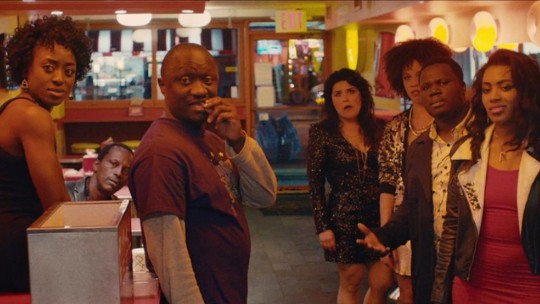
Similar to “The Ricklantis Mix-Up,” a large number of Master of None’s second season could have made this list, including its wonderful send-up of Bicycle Thieves and the touching “Thanksgiving” episode, but “New York, I Love You” stood out for its narrative swerve and its triad of empathetic stories. Departing from our regular cast to follow the stories of unique New Yorkers by way of camera pan, the episode showcased Master of None’s knack for finding compelling stories and wise commentary in the simplest of stories. Stories about the characters that make up the character of New York City may be rote material for TV, but Master of None’s unique viewpoints and celebration of diversity, from a Burundian cab driver to a deaf couple, made it one of 2017’s most powerful and important stories to watch.
#7. “Duet” (The Flash, Season 3, Episode 3)

Like Barry Allen with Singin’ in the Rain, I’m a sucker for a good musical, and The Flash’s celebration of the talented cast of Broadway stars and Glee-alumni amassed by it and its crossover show Supergirl was just way too much fun to not include on this list, despite a confusing direction for the episode’s central villain. The stars were all clearly having a grand time getting to put a superhero spin on a classical musical style, and while the show’s covers of existing song were stirring enough, it’s really the two original numbers that made this episode such a delight, including the tender “Running Home to You” from La La Land’s songwriters, and the clever wit of “Superfriends” from Rachel Bloom of Crazy Ex-Girlfriend fame.
#6. “Chicanery” (Better Call Saul, Season 3, Episode 5)
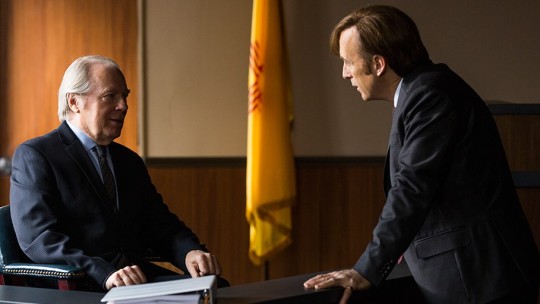
If Better Call Saul indeed ends up lasting as long as its predecessor, than “Chicanery” will sit as the exact middle of the show, and is appropriately a game-changing episode and the height of emotional drama thus far. The entire show has been building towards watching Jimmy McGill and his estranged brother Chuck going head-to-head in the courtroom, and the resulting conflict was one of the most intense watches of the year. The sharp plotting and rich characterization provided the perfect framework for a show-stopping performance by Michael McKean, whose vitriolic courtroom meltdown was absolutely shattering for viewers. Honestly though, the real reason this episode was guaranteed a spot on this list is because, of course, it also marked the return of Huell to the Breaking Bad world.
#5. “The Law of Non-Contradictions” (Fargo, Season 3, Episode 3)

“The Law of Non-Contradictions” was an outlier in the already peculiar early episodes of Fargo’s third season, moving the location of the show outside of frozen Minnesota for the first time, and transplanting Carrie Coon’s Officer Burgle to sunny California. While the pieces all falling into place in its final moments made Fargo my favorite show of the year, “The Law of Non-Contradictions” is one of my favorite episodes precisely because it doesn’t fit into the show’s larger narrative. Burgle’s investigation of her murdered stepfather’s past as a pulp science-fiction novelist ended up irrelevant to the case at hand, but its examination of the role of stories in our lives and the frequent failures of good intentions, themes that are enhanced by a beautiful animated story within its story, made the episode a key piece of the lingering power of Season 3.
#4. “USS Callister” (Black Mirror, Season 4, Episode 1)
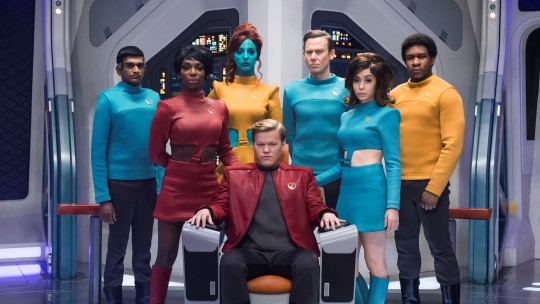
While Black Mirror’s terrifying Twilight Zone-like looks at technological trepidation made it into such an addictive show, it’s the episodes that break this mold that become some of my favorite episodes of television ever. “USS Callister” is the most visual effects heavy episode of the show ever, and, given it also runs at a full 80 minutes, could very well be considered a movie, but, like “San Junipero” before it, the true power of the episode comes from its place within the show’s loose anthology structure. The episode certainly gives a haunting look at the dangers of potential technology through its scathing indictment of the toxic masculinity festering in certain sects of fandoms, given form in Jesse Plemons’ perfect parody of William Shatner’s Kirk. However, what makes it one of 2017’s best episodes is its fulfillment of the intentions of its parody subject, Star Trek, with its thrilling adventure of a diverse crew working in harmony to overcome insurmountable odds.
#3. “Hero or Hate Crime” (Always Sunny, Season 12, Episode 6)

It’s Always Sunny in Philadelphia continues to show it deserves to become television’s longest running live-action sitcom, because every year it manages to put out at least a handful of great new episodes. Season 12 had a couple highlights, including a wickedly fun Always Sunny take on The Wiz, but “Hero or Hate Crime” understands that the greatest moments of the show come from just letting the cast bounce off one another. The gang’s debate over whether Frank’s use of a slur to warn Mac of a danger to his life constitutes as a hate crime is a fantastic source for the show’s riotous and outlandish, though never truly offensive, brand of dark humor. It’s all great fun, but it’s the episode’s unexpectedly moving ending, perhaps the first time Always Sunny can be considered an emotional experience, that cements “Hero or Hate Crime” as one of the finest episodes of the long-running series.
#2. “Dance, Dance, Resolution” (The Good Place, Season 2, Episode 3)

In what I like to consider the unofficial spiritual mascot of the Reboot Already Underway podcast, “Dance, Dance, Resolution” was the most madcap episode of a very madcap sitcom, an episode so intent on tearing down its status quo that watching it made one extremely nervous that the show had pulled yet another bait-and-switch and its finale was going to come unexpectedly in only the third episode of the season. Thankfully, the show didn’t end, finding a way to subvert all expectations yet again at the end of this extraordinary, joke-a-millisecond entry directed by Cabin in the Woods’ Drew Goddard. “Dance, Dance, Resolution” suggested that The Good Place truly does have an eternal source of cleverness to draw from for its twisted afterlife, made even clearer by the lengthy list of unused punny restaurant names that episode writer Megan Amram released on Twitter the following day.
AND THE BEST TV EPISODE OF 2017 IS....
#1. “Cryogenics, Lightning, Last Review” (Review, Season 3, Episode 3)
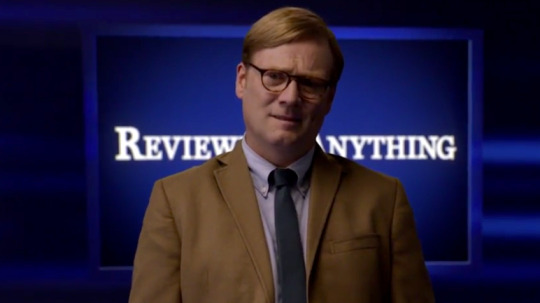
“Dance, Dance, Resolution” may have been such a clever deconstruction of its show’s premise that it seemed like The Good Place’s finale would come in just the season’s third episode, but Review actually did it. Review is perhaps the most underappreciated show of the decade, and, had the viewership justified it, I’m sure it would have never stopped being entertaining to watch Forrest McNeil’s absurd quest to review everything in life, no matter the cost to his health or personal relationships. While it’s sad to see such an ingenious show end, I couldn’t imagine a more perfect note for Review to go out on, an episode that saw the show’s cringe-inducing absurdism and glorious dark comedy in peak form. The tragedy of Forrest McNeil truly deserves a place alongside the great works of the Greek poets and Shakespeare, a downfall that simply must be experienced in its entirety for yourself. So, I’ll say no more than: I give this episode… all the stars.
NEXT UP: THE 2017 AARON FOR BEST TV PERFORMANCE!
#tv#TheAarons#TheAarons2017#TheAaronsTV#bestof#bestof2017#reviewcc#BoJack horseman#the good place#master of none#the flash#better call saul#black mirror#uss callister#always sunny#rick and morty
1 note
·
View note